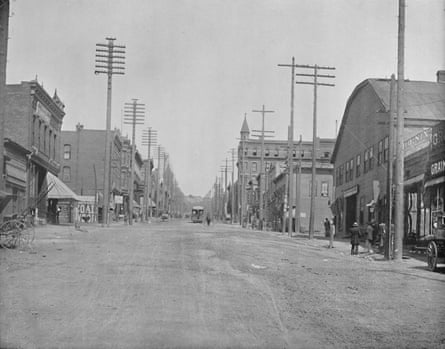Kevin Barry, who is equally dedicated to the short story and the novel, has proved since the bog-gothic of his debut story collection, There Are Little Kingdoms (2007), that what marks him out is a restless originality. He has never repeated himself, each novel taking his talent in an unexpected direction. The Goldsmiths prize-winning Beatlebone (2015) was about John Lennon and his island off the coast of Ireland; his next novel, Night Boat to Tangier (2019), took two ageing drug dealers to southern Spain.
And now – Barry is always inspired by place – he has written an American novel, specifically a western, which my advance copy says was “25 years in the making”.
The story opens in a dense and tangled manner before thinning out into a single narrative thread. It’s 1891 and we’re in Butte, Montana, “town of whores and chest infections”, and a real place despite the Barryesque name. The city is growing because of the mining industry, and taking in as much imported labour as it can, many of whom are Irish. (Even now, Butte is reportedly the city in the US with the highest proportion of Irish-American citizens.)

Central among them is Tom Rourke, a fiend for the dope and the drink, who only wants from life “quiet and stillness” but not enough to go and find them. Instead he gets involved, first with Greta of the Black Feather bar, which doesn’t work out (“She twisted a slender Bavarian thigh and locked it tightly around his jaw and squeezed”). And so he flits and drifts despairingly, even contemplating suicide, but doesn’t go through with it. “What kind of fucking Irishman can’t even do away with himself?”
Then in a photographic studio he spies a woman with her husband, and “it was at this moment his heart turned”. She is Polly Gillespie, newly married to Long Anthony Harrington, but already bored with him “kissing and pecking at her like a nervous old hen”, which doesn’t promise much sexually – but “at least it was quick when it happened”. So she is ripe for a Rourke-shaped adventure, and soon they’re in bed together, with Tom “roaring like a train like a boy who never come in his entire life before”.
after newsletter promotion
Tom and Polly hatch a plan involving arson, theft of a chunk of cash, and an escape out west, and the main action of the novel is under way. And as the lines quoted here suggest, this is a book where everything springs alive from the page, so you need to take it slowly. Doing so gives the short atmospheric scenes time to marinate in the mind and adds an epic feel despite the novel’s brevity; the style, peppered with run-on sentences and hardly any commas, has a dash of Cormac McCarthy and Charles Portis to it.
We move to a quest and a chase, as Tom and Polly seek out a new home and encounter a sequence of misfits from “Frenchie types” to the funny, sinister figure of the Reverend. Meanwhile Polly’s husband seeks out her and Tom, assisted by a Norwegian bounty hunter with a “calamitously outsized rear-end” and a sheriff with no love for the Irishman either. “The best part of Thomas Rourke dribbled down his father’s good leg.”
Tom and Polly seem to get on, settling into a relationship where “they could talk to each other… without speaking”. But will they reach their happily ever after? It’s all in the hands of fate, isn’t it? Tom repeatedly observes that his actions are “fated”, that “there was no choice to it”, and characters appear “as if directed to the scene by hands unguessable”. Barry is reminding us, Muriel Spark-like, of the artifice of fiction, and of the author’s omnipotence over his characters – a sense enhanced by a reference to “writing men with a penchant for the high style” and a moment when Tom sees a newspaper clipping of “The Twelve Rules for Writing Western Adventures” (“There’s fucken twelve of ’em?”).
But Barry doesn’t write according to the rules. The fun of the romp recedes and the closing chapters offer a different, satisfying register in a minor key, a break from the pace but with new depth. It’s a risk, but that is what Barry’s writing is all about, after all. He has made it pay off before, and he does it again here.
-
The Heart in Winter by Kevin Barry is published by Canongate (£18.99). To support the Guardian and Observer order your copy at guardianbookshop.com. Delivery charges may apply
Source: theguardian.com

